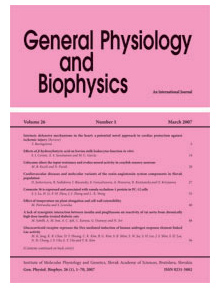Journal info
|
||
Select Journal
Journals
Bratislava Medical Journal Ekologia - Ecology Endocrine Regulations General Physiology and Biophysics 2025 2024 2023 2022 2021 2020 2019 2018 2017 2016 2015 2014 2013 2012 2011 2011 Special Issue 2010 2009 2008 2007 Neoplasma Acta Virologica Studia Psychologica Cardiology Letters Psychológia a patopsych. dieťaťa Kovove Materialy-Metallic Materials Slovenská hudba 2025Webshop Cart
Your Cart is currently empty.
Info: Your browser does not accept cookies. To put products into your cart and purchase them you need to enable cookies.
General Physiology and Biophysics Vol.30, No.3, p.263–270, 2011 |
||
| Title: Modulations of behavioral consequences of minor cortical ischemic lesion by application of free radicals scavengers | ||
| Author: Kateryna Deykun, Marie Pometlova, Barbora Schutova, Jan Mares | ||
| Abstract: Functional and morphological consequences of ischemic lesions are partially related to the production of reactive oxygen species (ROS). The aim of the study was to create a unilateral photothrombic lesion with minimal morphological changes and minor sensorimotor and cognitive deficits and also to test whether the application of ROS scavengers after the end of induction of ischemia had improved the functional outcome. Adult Wistar male rats were randomly divided into five groups: naive control, sham operated animals, animals with induced ischemia, and two groups of animals with induced ischemia and subsequent ROS scavenger application –melatonin or tempol. The group subjected to ischemia showed a significant decline in performance in sensorimotor tests and the Morris water maze (MWM) test, compared to control animals. Tempol (50 mg/kg, i.p.) did not improve sensorimotor function and did not change spatial learning. Melatonin (100 mg/kg, i.p.), on the contrary, resulted in a significant improvement in animals’ performances. All the ischemia subjected animals had increased speed of swimming in the MWM test, compared to the control group. Our findings showed that subsequent application of ROS scavengers improve ischemia outcomes, with melatonin being more potent. Conversely, neither melatonin, nor tempol decreased swimming speed cased by ischemia. |
||
| Keywords: Cortical ischemia — Cognitive impairment — Behavior — ROS scavenger | ||
| Year: 2011, Volume: 30, Issue: 3 | Page From: 263, Page To: 270 | |
| doi:10.4149/gpb_2011_03_263 |
||
|
|
 download file download file |
|
|
2011 Special Issue |

